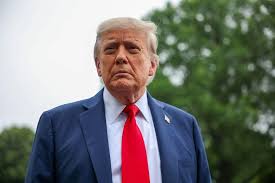Just when it seemed that immigration debates in the United States couldn’t get any more contentious, the Supreme Court delivered a ruling that sent shockwaves through communities, advocacy groups, and political circles alike.
In a nearly unanimous decision, the court cleared the way for the Trump administration to revoke protections for hundreds of thousands of Venezuelan migrants—a move with immediate and potentially life-altering consequences.
The ruling, hailed by some as a legal triumph and condemned by others as a humanitarian setback, raises difficult questions: Why now? Who stands to benefit politically or economically? And could this decision be merely the opening salvo in a broader, more controversial immigration strategy?

The Supreme Court’s decision represents a major legal victory for President Donald Trump. In an 8–1 ruling, the court overturned a lower court injunction that had temporarily blocked the administration from rescinding the Temporary Protected Status (TPS) granted to Venezuelan nationals. The lone dissent came from Justice Ketanji Brown Jackson, appointed by former President Joe Biden, who expressed concern about the broader humanitarian implications of the ruling.
TPS, a discretionary designation granted to nationals from countries experiencing extraordinary conditions that make safe return impossible, has long been a cornerstone of U.S. immigration policy in crisis situations. In the case of Venezuelans, the designation initially provided relief for those fleeing political instability, economic collapse, and widespread shortages of basic necessities.
Now, the Supreme Court’s ruling empowers the Trump administration to terminate this status for approximately 300,000 Venezuelan migrants. Government attorneys confirmed that the decision allows deportations to move forward, though advocates warn that the consequences for families and communities could be devastating.
U.S. Solicitor General John Sauer, representing the federal government, argued before the Supreme Court that the district court had overstepped its authority in blocking the revocation. Sauer emphasized the inherently discretionary nature of TPS designations, framing them as “highly sensitive, foreign-policy-focused judgments” that fall squarely within executive authority. He described the lower court’s reasoning as “untenable,” framing the case as one of constitutional principle as much as immigration policy.
Secretary of Homeland Security Kristi Noem formally ended Venezuela’s TPS designation via a memo in February, with the revocation set to take effect in April. In the memo, Noem asserted that the situation in Venezuela had changed sufficiently to no longer meet the requirements for temporary protected status. She wrote that allowing Venezuelans to remain temporarily in the U.S. “no longer aligns with the national interest,” signaling a policy shift from the Biden-era approach.
For context, Venezuela had first been granted TPS on March 9, 2021, under Secretary Alejandro Mayorkas, citing “extraordinary and temporary conditions” that prevented safe repatriation. That designation was extended for 18 months on September 8, 2022, and then “redesignated” on October 3, 2023, for an additional 18 months.
This created overlapping TPS statuses: the 2021 designation and the 2023 designation. In January 2025, Mayorkas further extended the 2023 designation, simplifying the application process and allowing all eligible Venezuelans to apply for TPS by October 2, 2026, regardless of the specific designation under which they qualified.
However, the policy shifted dramatically on January 28, 2025, when Secretary Noem reversed Mayorkas’s extension, reinstating the prior status quo and triggering immediate legal challenges. In March, U.S. District Judge Edward Chen of the Northern District of California blocked Noem’s action, criticizing the depiction of migrants as potential criminals as “unfounded and replete with racism.” That injunction set the stage for the Supreme Court review that culminated in the landmark 8–1 decision.
The human stakes of this ruling are enormous. According to Department of Homeland Security figures as of late October 2025, more than 527,000 individuals have already been deported since Trump’s inauguration on January 20, 2025. Of roughly 2 million total departures, 1.6 million were voluntary. DHS anticipates that these figures will continue to rise, with increased funding and resources devoted to enforcement operations.
For Venezuelan migrants living in the United States, the Supreme Court decision has turned long-term stability into uncertainty.
Families who have spent years building lives, careers, and communities now face the possibility of forced separation or return to a country still grappling with political turmoil and economic collapse. Legal experts note that while TPS does not guarantee permanent residence, it provides essential protections that allow recipients to work legally and contribute to U.S. society without fear of deportation.
Politically, the ruling is being framed as a win for Trump’s broader immigration agenda, reinforcing executive authority over border and migrant policies. Supporters argue that the court reaffirmed the president’s constitutional prerogative to make discretionary decisions in matters of national security and foreign relations. Critics, meanwhile, warn that the decision undermines humanitarian safeguards and sets a precedent that could affect other vulnerable migrant groups in the future.
Beyond the immediate legal and political ramifications, the ruling underscores the deeply contentious nature of immigration policy in the United States. It highlights the tension between executive authority, judicial oversight, and the human costs borne by migrants who are caught in the crossfire of policy debates. Advocacy groups have pledged to continue fighting for protections, while DHS and federal immigration agencies prepare for the next phase of enforcement.
In the end, the Supreme Court decision is more than a legal footnote—it is a defining moment in U.S. immigration policy. For the 300,000 Venezuelan nationals directly affected, and countless others watching the outcome, the ruling represents a stark reminder that the future of migration policy can change overnight. It also serves as a cautionary tale of how legal interpretations, executive discretion, and political agendas intersect to shape lives in ways that are both immediate and irreversible.
As the nation watches the legal battles and enforcement actions unfold, one question looms large: how will the United States balance the rule of law with humanitarian responsibility, and what lessons will be drawn from this pivotal case?
